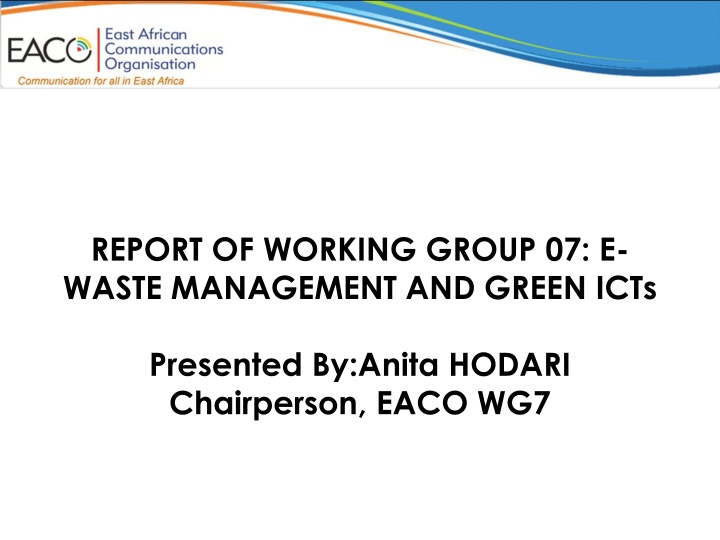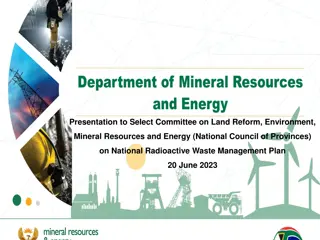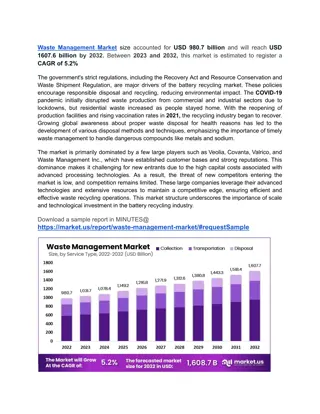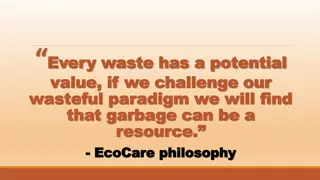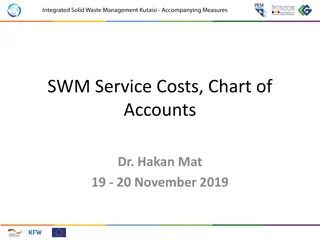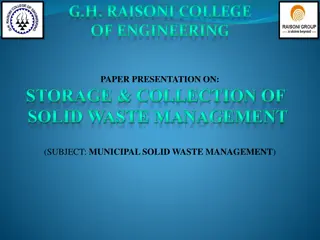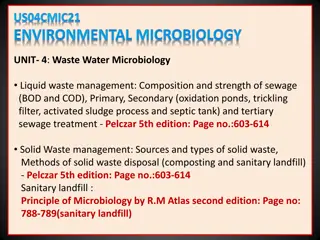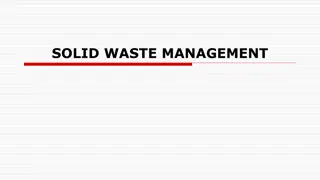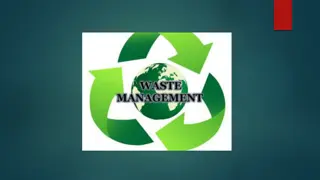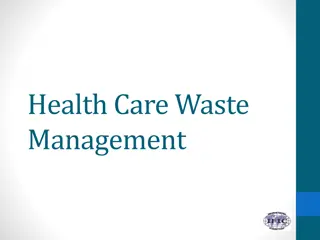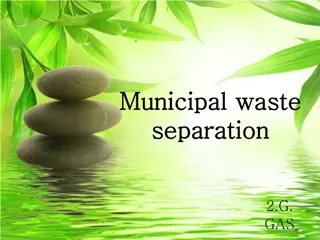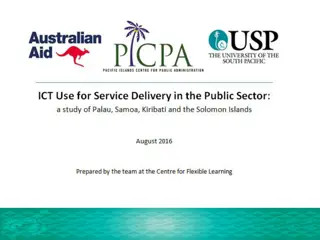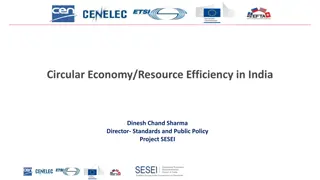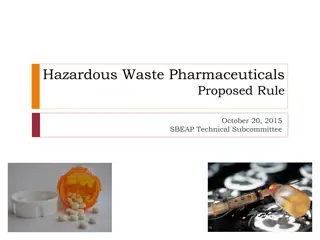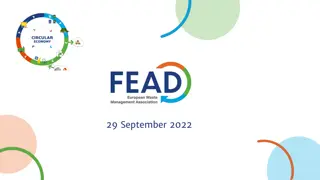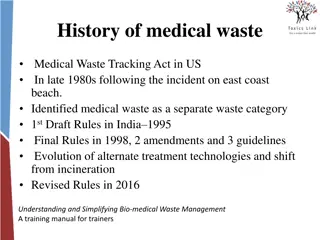Report on E-Waste Management and Green ICTs
The report presents the activities of Working Group 07 on E-Waste Management and Green ICTs for the 2023/2024 cycle. It includes information on membership, meetings, workshops, goals, and terms of reference to address e-waste challenges in the East African region.
Download Presentation

Please find below an Image/Link to download the presentation.
The content on the website is provided AS IS for your information and personal use only. It may not be sold, licensed, or shared on other websites without obtaining consent from the author.If you encounter any issues during the download, it is possible that the publisher has removed the file from their server.
You are allowed to download the files provided on this website for personal or commercial use, subject to the condition that they are used lawfully. All files are the property of their respective owners.
The content on the website is provided AS IS for your information and personal use only. It may not be sold, licensed, or shared on other websites without obtaining consent from the author.
E N D
Presentation Transcript
REPORT OF WORKING GROUP 07: E- WASTE MANAGEMENT AND GREEN ICTs Presented By:Anita HODARI Chairperson, EACO WG7
Background Group This activities in the 2023/2024 cycle The group continued with activities carried forward from the last cycle and undertook new activities as outlined in this report Working accomplished numerous
Membership Burundi Kenya Rwanda South Sudan Tanzania Uganda In EACO Secretariat Chairpersons & Rapporteurs Chairperson Rwanda Vice-Chairperson - Tanzania. Burundi - 1stRapporteur and; Kenya - 2ndRapporteur.
Meetings & Workshops The working group conducts its business through: physical meetings, online meetings, training, workshops During this financial year 2023/24, WG 07 held Five (5) online meetings and will hold its physical meeting on 14th-15thMarch 2024. All represented workshops. Consistency was maintained EACO member in the countries said meetings were and
ToRs for the WG 07 To analyze the level of e-waste in the region and its impact on humans and the environment. To harmonize policies, strategies and regulations on e-waste management in the region. To recommend adoption of green ICT best practices by stakeholders in the communications sector. To recommend national environmentally sound e-waste management systems for the EAC region. To develop strategies for public awareness on issues relating to e-waste. and regional
Terms of reference for the WG 07 To recommend collaboration/cooperation between National ICT Regulators, National Environmental Management Authorities and other environmental management Agencies with a view strengthening the e-waste management systems within the region. To coordinate and follow up the work of the relevant ITU Study Group(s) and facilitate the development of regional contributions relating to the work of this ITU Study Group(s) or other relevant regional organization. To harmonize the framework for ICT gadgets management within the region strategies for to establishing and recommendations or international and counterfeit
Terms of reference for the WG 07 To recommend collaboration/cooperation between National ICT Regulators, National Environmental Management Authorities and other environmental management Agencies with a view strengthening the e-waste management systems within the region. To coordinate and follow up the work of the relevant ITU Study Group(s) and facilitate the development of regional contributions relating to the work of this ITU Study Group(s) or other relevant regional organization. To harmonize the framework for ICT gadgets management within the region strategies for to establishing and recommendations or international and counterfeit
Framework & Committees Framework - Model Framework on E-waste Management for the Region is in place. - The framework gave guidelines to countries regarding formulation Management in the region Committees - National E-waste Management Steering Committees - Regional Steering Committee of E-waste
Updates from National Steering Committees Burundi Worked in collaboration with ITU on E-waste Policy Completed the ITU-sponsored pilot survey of Harmonization of E-waste Data Kenya In the process of setting up an E-waste Demonstration Site at its Konza City Technopolis Completed the ITU-sponsored pilot survey of Harmonization of E-waste Data Rwanda More awareness activities on e-waste were undertaken especially through media and workshops/Training informal sectors dealing with e-waste Management. EPR Implementation Guidelines on e-waste management supported by ITU/UNEP by the led of Government institutions. Increasing collection points in the whole country for easy disposal of e-waste Management from the public sponsored by different partners in Collaboration with Envorserver Industry. We have more than five licensed companies, one is operating under PPP.
Updates from National Steering Committees Tanzania Completed ReduCE-waste project by PREVENT Alliance in collaboration with EACO, UNITAR-SCYCLE and WRF in 2022. South Sudan The National Communication Authority (NCA) in collaboration with the Ministry of Environment and Forestry has formulated the National Steering Committee. The NSC is in Place and the E- waste Agenda is taking shape. Uganda Baseline study on e-waste is completed On 10th June 2021, Uganda launched National E-waste Collection Facility under the guidance of the National Steering Committee and support of UCC. Uganda have a new law on Environment with provisions on E- waste and Waste Management Regulations Surveillance on counterfeit products in the country is on-going through the relevant authorities.
Regional E-waste Strategy The current Strategy is for 5 years, commenced in 2022 and will end in 2027. Pillars of strategy: - Policy, Legal and Regulatory framework - Infrastructure for e-waste management - Resource mobilization - Coordination and institutional alignment - Capacity building, Research and Innovation The implementation of this strategy is in its 2ndyear and is ongoing.
E-waste Projects and Funding These projects were completed and members agreed to give priority to legal and regulatory frameworks, infrastructure, data and awareness in the coming funding phases. The reports of ReDuce-Waste and E-waste Survey/Data Harmonization are available on EACO website.
E-waste Projects and Funding ReDUCE-Waste PREVENT Waste Alliance/GIZ-sponsored ReduCE-waste Project which was implemented in Tanzania. This was a cooperation between the United Nations Institute for Training and Research (UNITAR) and WRF with the local partners National Environment Management Council (NEMC), the Vice President Office (VPO), and the East African Communications Organization (EACO), initiated under the PREVENT Waste Alliance.
E-waste Projects and Funding This project was on Domestication of the technical e-waste guidelines under Basel convention for the Control and Management of electric and electronic equipment shipped in Tanzania. The funding amount was Euros 23,000. It was recommended that this project be replicated in the other EACO Member Countries. In conclusion, implementation of a stringent import control regime based on the outcomes of the Reduce Waste project in Tanzania would be a major breakthrough.
E-waste Projects and Funding WEEE Data Harmonization ITU sponsored E-waste conducted on pilot studies in Kenya and Burundi. Data Harmonization Project - This Telecommunication Union (ITU) and the United Nations Institute for Training and Research (UNITAR-SCYCLE) aimed at improving the quality, collection, and interpretation of e-waste data in East Africa. was a collaborative study between the International Sustainable Cycles Programme The six EACO countries and their respective National Statistics Offices were involved. The project sponsorship was USD 120,000. It was recommended that funding be sought to undertake a comprehensive survey in the establish a baseline data on E-waste for reference in the region. EACO Member Countries to
Capacity Building Through the ITU-sponsored Harmonization of E-waste Data project, members of WG 07 and representatives of the National Statistical Offices of EACO Member Countries were trained on E-waste Data Toolkit. Capacity building on Green ICTs and E-waste Management will continue through workshops/training.
Awareness workshops Working Group awareness on e-waste through workshops. The 5the-waste workshop took place from 20thto 22nd March 2023 in Dar Es Salaam, Tanzania. The report of the workshop is in the detailed report and posted on EACO website. This was the most successful awareness workshop with over 400 participants, both physically and virtually. This year, the 6the-waste management awareness workshop is happening here in Juba, South Sudan, 11th 13thMarch 2024. The continued to enhance
E-waste Survey This is aimed at having a baseline survey to establish current e-waste status in the region. Kenya, Rwanda, Tanzania, and Uganda have done their own surveys. Burundi and South Sudan to commence their surveys once they receive support. The ITU funded EACO to the tune of US $ 120,000 for Regional WEEE Data Harmonization project aimed at supporting EACO region in establishing baseline data on E-waste which was completed. This was a pilot study conducted in Kenya and Burundi.
E-waste Innovation Competition EACO WG 07 is planning to hold an e-waste innovation competition/awards. This is proposed to be done annually/bi-nnually during Assemblies/Congress. It will recognize the various innovations and good initiatives on e-waste management The innovation awards concept is in the detailed report
Green ICTs WG 07 is in the process of formulating a comprehensive information paper on Green ICTs which will be recommended for adoption by members to green their organizations and share with other stakeholders. The WG7 will continue to participate in activities related to Green ICT at the regional and international levels, especially the Green Standards Week.
Counterfeit Gadgets Management Working Group is frameworks on the management of Counterfeit Gadgets and identify member states. This work slowed down due to few number of experts. We are calling for experts in this area to join the working group and help in progressing this specific task, among others. The Working Group is benchmarking on existing frameworks and international best practices and will formulate a uniform framework within the EACO member states. The reviewing the existing gaps within the EACO
EACO Strategic Plan 2023 - 2028 EACO prepared its Strategic Plan 2023 2028 and Chairperson and Vice Chairperson represented the Working Group in the two physical workshops and related activities organized by EACO for the preparation of the EACO Strategic Plan. Working Group 07 provided their inputs into the plan.
Partnerships o We have good partnerships with EACO s partners and we will continue to collaborate with them in the management of E- waste in the region. o The working group will continue to bring more partners on board, expand scope and partners base, improve and obtain more inputs from other experts global trends in e-waste
Contribution to ITU and other regional organizations The Working Group continued to actively follow the work of regional and International organizations, especially ITU-T Study Group 5: Environment, EMF and Circular Economy (Question 7) and ITU-D Study Group 2: ICT Services and Applications for the promotion of sustainable development (Question 8) EACO member organizations are requested to continue supporting the participation of their staff in the said Study Groups.
Challenges at different Countries management Low awareness levels in the public Constrained financial resources in implementing infrastructure for E-waste management. Slow pace in reviewing the existing e-waste laws, regulations and guidelines to reflect the current environment and formulation of new ones. Inadequate representation providers/operators (telcos, broadcasters) in WG 07 meetings. are levels on e-waste of service
Conclusion and Future Work Working Group 07 registered a number of milestones during this period as already highlighted above and as shown in the status of its Work Plan. It will continue to undertake the actions spelt out in the work plan. More importantly, the working group will focus on the implementation of the Regional E- waste Strategy 2022 2027 Regional E-waste Facility E-waste Fund Zero Negative Impact of E-waste
RECOMMENDATIONS 1. Countries to enact various laws, regulations, guidelines and standards on e- waste management 2. Member States to consider allocating a budget for e-waste management in order to conduct more awareness and fund e-waste management projects 3. Member states to continue with the implementation of the 2ndRegional E- waste Management Strategy (2022 2027) while sharing experiences and success stories. 4. Member states to device mechanisms for getting e-Waste from the Government and its institutions for proper disposal 5. There is need to have more experts on Green ICTs and Counterfeit Gadgets management in WG 07 6. EACO member organizations should continue supporting the participation of their staff in ITU-T and ITU-D study groups related to E-waste.
E-waste management starts with you And E-waste is no longer waste its Resources. ?
